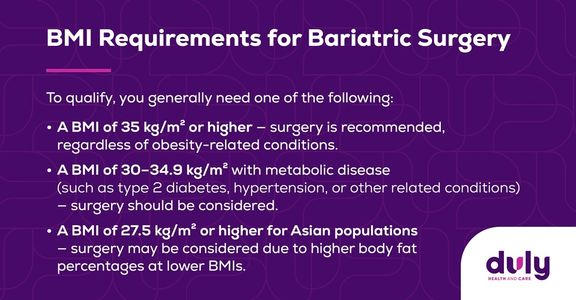Cutting carbs, hitting the gym, using weight loss medications…it seems like you’ve tried anything and everything under the sun to lose weight. Yet no matter how hard you try, the weight just won’t come off.
For many people, lifestyle changes are enough to get to a healthy weight. But for people who are obese, there’s a treatment that might be even more effective: surgery.
At a Glance: Bariatric Surgery
- Qualifying factors: Surgery is usually recommended for a BMI ≥ 35 kg/m², or ≥ 30 kg/m² with metabolic disease such as type 2 diabetes or hypertension. For Asian populations, it may be considered at BMI ≥ 27.5 kg/m² with comorbidities.
- Health impact: Bariatric surgery can dramatically improve or resolve conditions like diabetes, high blood pressure, and heart disease — often eliminating the need for medication.
- Long-term success: Patients receive lifelong support from a multidisciplinary team to maintain weight loss and overall health.
Bariatric surgery (also called weight loss or metabolic surgery) changes how your digestive system works to help you lose weight. It can help you lower your risk of diabetes, potentially life-threatening problems (like heart attack or stroke), certain cancers, and high blood pressure. It can also help you manage existing type 2 diabetes.
Despite its many benefits, bariatric surgery is underused. Many people aren’t sure who qualifies for bariatric surgery or if it’s a good option for them.
Interested in bariatric surgery, but not sure if you’re a candidate? Here are eight questions to ask yourself.
1. What Is My Body Mass Index (BMI)?
BMI is a measurement based on your weight, height, and sex, and it indicates if you’re overweight or obese. While BMI doesn’t always tell the full story about your health, it is critical to determining if you’re a candidate for bariatric surgery.
A BMI of 30 or higher is considered obese, but not everyone who is obese qualifies for surgery.

Also read: Know Your Numbers: How to Calculate Body Mass Index
2. Am I Having Trouble Managing Type 2 Diabetes?
For people with type 2 diabetes who are also obese, bariatric surgery is one of the most effective treatments – sometimes even more effective than just taking medication or making lifestyle changes. In addition to helping with weight loss, bariatric surgery can lower blood sugar and eliminate or reduce the need to take medication.
Weight loss surgery improves diabetes management in almost every case – 78% of people with type 2 diabetes who get bariatric surgery stop needing diabetes medication.
Also read: 6 Things to Know About Type 2 Diabetes and Bariatric Surgery
3. Have I Tried Other Ways to Lose Weight?
Bariatric surgery is highly effective, but it isn’t necessarily the first line of treatment. Before qualifying for surgery – especially if your BMI is below 35 – your insurance company may require you to have tried other methods, first.
A Word from Our Doctor:
“For many patients, bariatric surgery is the culmination of a long, difficult journey — often filled with self-blame, failed diets, and frustration. But it doesn’t have to be that way. Bariatric surgery remains the most effective long-term solution for significant weight loss, often outperforming medications alone.
Our team has performed over 1,000 minimally invasive procedures—including gastric sleeve, gastric bypass, duodenal switch, and complex revisional surgeries — all using laparoscopic or robotic techniques. Every procedure is performed at a Center of Excellence – designated hospitals, ensuring the highest standards of safety, outcomes, and patient care.
In fact, more than 90% of our patients are able to go home the very next day.”
- Dr. Jihad Kudsi, MD, MBA, FACS, Board Certified Surgeon and Obesity Medicine Physician, Chair of Surgery and Clinical Board of Directors at Duly Health and Care & Medical Director of Bariatric Surgery at UChicago AdventHealth LaGrange Hospital
4. Am I Ready to Make Significant Lifestyle Changes After Surgery?
Your ability and willingness to change your diet and exercise habits after surgery is key to success. Without dedication, it can be easy to slip back into old patterns and regain weight. That’s why, if you’re not ready to make those changes, surgery might not be the best option just yet.
There are other lifestyle changes besides diet and exercise that you should be prepared to make after surgery. You will likely need to:
- Take vitamins and mineral supplements for life
- Avoid or severely limit alcohol use, especially within the first year of surgery
- Have regular follow-up visits with a bariatric specialist (every few months for the first year, and every year for life)
Making lifestyle changes after bariatric surgery is a journey, but you won’t be doing it alone. Our bariatric team includes surgeons, nutritionists, psychologists, and specialized nurses who will support you every step of the way.
Ready to see if you’re a candidate? You can schedule an appointment online, or call 630−790−1700 to determine if bariatric surgery is appropriate for you.
5. How Is My Mental Health?
Many health systems and insurance companies require a psychological exam before being cleared for surgery.
During your exam, you will discuss topics like your psychiatric medical history, behavior patterns (like poor impulse control), mood disorders, history of eating disorders, or past traumas. You will also be asked about alcohol and drug use. Depending on your responses, you may need to get mental health counseling before surgery or delay surgery until you get treatment for conditions like substance use disorder.
It’s critical to be honest during these evaluations. The evaluations aren’t designed to stop you from getting surgery. They are there so that your provider can be armed with the information and tools they need to set you up for success and keep your mental health in check after surgery.
Also read: Robotic Bariatric Surgery
6. Will My Medical History Affect Whether or Not Surgery Is Safe and Successful?
Some medical conditions, like severe heart or lung disease, can make any surgery risky. There are also conditions like Crohn’s disease or cirrhosis that may come with additional risks.
Just like your mental health, having other medical conditions doesn’t necessarily mean you can’t get surgery. Your provider will look at the risks and benefits and may have you take some extra precautions.
In some cases, having another condition might actually make your provider even more keen on recommending surgery. Bariatric surgery can often help improve symptoms of conditions such as asthma, sleep apnea, or migraine disorders in people who are obese.
Also read: The Head-to-Toe Benefits of Bariatric Surgery
7. What Are My Goals for Family Planning?
Being obese can decrease both female and male fertility. It can affect ovulation in women and reduce testosterone production and sperm count in men. Bariatric surgery is known to help women get pregnant, so it may be a great option if you’re hoping to conceive.
That said, your family planning goals do need to be taken into account when deciding whether or not to have surgery. Women should be at their lowest possible weight and have good nutrition, so it’s recommended that they do not get pregnant within 12 to 18 months after surgery. If they’re looking to get pregnant ASAP, it’s a good idea for them to hold off on the surgery.
8. Do I Know How to Get Support After Surgery?
Having a supportive family or social circle can make recovery and weight maintenance easier, but there are other ways to receive support.
Also read: Supporting A Loved One’s Weight Loss Journey
Many bariatric surgery programs never discharge their patients, which means you will have lifelong medical care. You can see a team of specialists, such as your surgeon, dietitians, and psychologists. Healthcare systems often hold regular support groups where you can talk with others who have also gone through surgery.
Whenever you need support – whether it’s before the surgery, the day after surgery, or years down the line – your team is there for you. You don’t have to go through the challenges or celebrate the successes alone.
Want to learn more about bariatric surgery? Schedule an appointment with a Duly Health and Care provider or call 630−790−1700 for more information.







